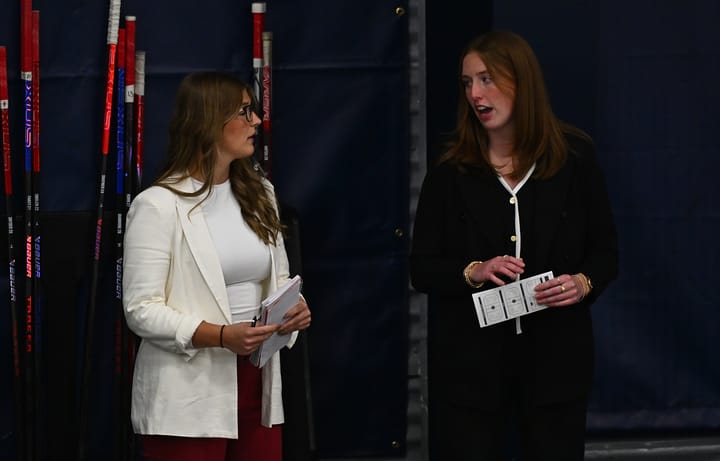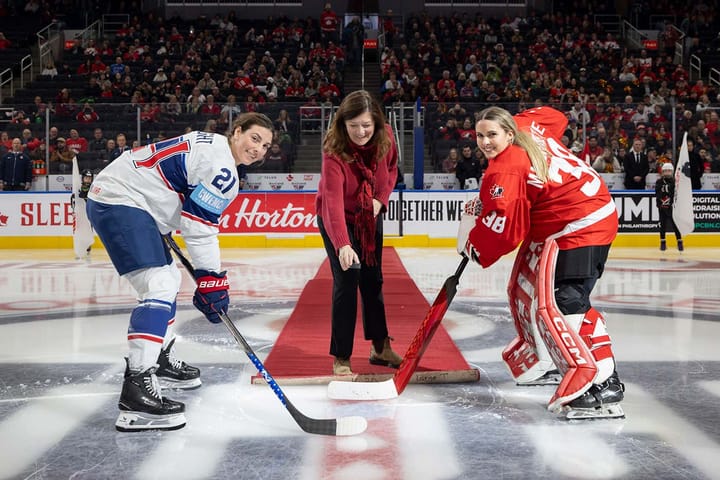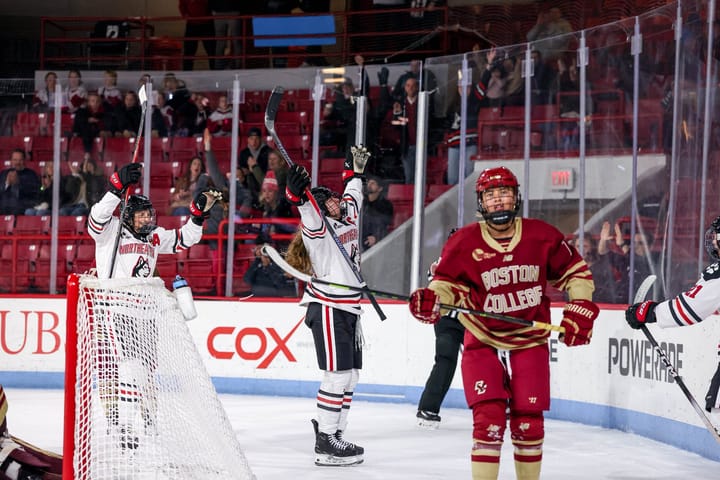Brigette Lacquette is paying it forward
The Calgary Inferno defender is using her platform to embolden Indigenous youth all over Canada.
Calgary Inferno defender Brigette Lacquette made history in February 2018 when she became the first First Nations woman to play on Canada’s Olympic hockey team. By making that history, Lacquette gave First Nations girls something they didn’t have before and something she herself lacked going up: a female representative in hockey, on the world’s biggest stage.
Since then, Lacquette has taken it further. Not content to be merely a recognizable face, she’s spent the months since returning from South Korea traveling across Canada, giving her time to support education initiatives and the broad swath of Indigenous communities all over the country. She regularly visits reserves and schools, works with the Calgary-based Classroom Champions mentorship program, and speaks at various charitable events all over the country.
Prairie Roots
Lacquette, 25, is a member of the Cote First Nation. According to their website, the band ”has a current membership of 3,900 people with approximately 900 living on reserve. Cote First Nation is one of the six First Nations that are members of the Yorkton Tribal Council and is also part of the Treaty Four.” Their reserve is located north of Kamsack, Saskatchewan, near the Manitoba border.
Lacquette didn’t grow up on reserve. She grew up in Mallard, Manitoba, a rural lakeside Métis community a little over 300 kilometers northwest of Winnipeg. Métis are people who trace their ancestry through both Indigenous North American peoples and European settlers. Lacquette’s Olympic teammate, Markham Thunder defender Jocelyne Larocque, is of Métis descent and won gold with Team Canada in 2014.
According to 2016 Census data, Canada’s Indigenous population sits close to 1.7 million. That includes First Nations, Inuit, and Métis people, as well as those who cite multiple Indigenous identities and those who cite an Indigenous identity not listed elsewhere. They make up 4.9% of Canada’s population.
The lingering impact of European colonization, forced assimilation and family separation through the residential school system, institutionalized racism, displacement, and other issues still weigh heavily on Canada’s Indigenous peoples. Children are not immune, as Lacquette knows too well and as incidents like the Coupe Challenge Quebec AAA in May 2018 show.
The First Nation Elites Bantam AAA team, comprised of 13- and 14-year-old players from several Cree, Atikamekw and Algonquin communities in Quebec, as well as from First Nations communities in Ontario and Nova Scotia, were subjected to racist taunts from opposing players, spectators, and at least one coach.
Lacquette’s father Terance recalled a similar instance to The Star’s Bruce Arthur back in February, of a 12-year-old Brigette in tears on the bench during a tournament due to racist abuse from the opposing team. He told her to “beat them on the ice,” a lesson in that special motivating mix of stubbornness and perseverance that she now passes on to the kids she mentors.
Dedication to Service
Lacquette is keenly aware of her position as a role model while simultaneously being somewhat overwhelmed by it. She is familiar to the children she speaks to in ways a non-Indigenous athlete will never be.
“You know I didn’t realize, right after the Olympics...I always say this, but I didn’t really realize the impact I had until I started going to these communities and seeing the looks on their faces and how excited they got when they met me, or they cried when they met me. It was pretty bizarre,” she stated.
As odd as the feeling might be, Lacquette doesn’t shy away from it. She takes her status and her platform seriously, and is determined to make sure the children know they’re not alone:
“I can definitely relate to a lot of the kids so I think that’s kind of why when I tell my story they’re always like, ‘oh this happened to me too!’”
First Nation Olympian and @HockeyCanada national women’s team member @briglacquette visits @wikwemikongbe schools today sharing message of resilience, perseverance and hard work! pic.twitter.com/bE1EDVKqGQ
— Marcia T-B (@marciatrudeau) April 24, 2018
“You know, it’s kind of tough, to be honest with you,” she answered, when asked about her views on combatting racism. “For myself, growing up, and having to face racism and having to face getting bullied in school, it’s tough to go through it as a kid.
“I always tell the kids who I speak to and whatnot that obviously it’s not going to be easy, it’s going to take a lot of hard work and determination and perseverance...it’s going to be tough, but it’s definitely worth it to go through all that.”
“I didn’t really realize the impact I had until I started going to these communities.”
Lacquette’s activism has earned her numerous accolades throughout 2018, including a Dreamcatcher Award from the Dreamcatcher Charitable Foundation and Female Athlete of the Year title from Sport Manitoba. Most recently, she was announced as a 2019 recipient of the prestigious Indspire Award, which their website describes as “the highest honour that the Indigenous community bestows on its own people.”
Lacquette and the other 11 recipients visited Parliament Hill in Ottawa and will be honored on February 22 at an awards gala in Calgary.
Meet the 2019 #IndspireAward Recipients. Chi-miigwech, Nia:wen, ᓇᑯᕐᒦᒃ (Nakurmiik), to Speaker Geoff Regan for welcoming and announcing this years’ recipients. pic.twitter.com/PjM1YAdbxr
— Indspire (@Indspire) September 25, 2018
Lacquette’s activism isn’t designed to boost her public profile or capitalize on a post-Olympics branding opportunity. It’s altruistic, good work for the sake of doing good work, rooted firmly in the love she has for her identity and those who share it.
“I think the National Team and the Olympics kind of gave me a platform to be able to share my story and inspire kids...because you know, I’ve kind of been through so many things that they go through daily,” she told The Ice Garden. “Every community kind of made an impact on myself, and I feel like I made an impact on them.”
Thanks to Sonya Ballantyne for the beta reading.





Comments ()